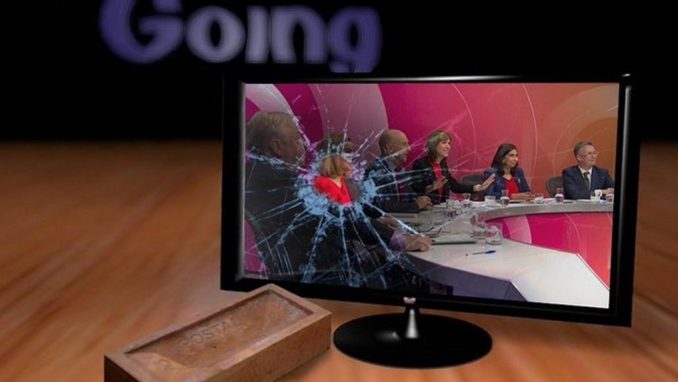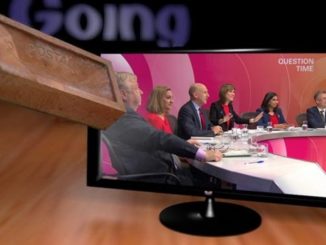
Election Results Special Question Time 13th December 2019
Panel:
Grant Shapps (Conservative)
Stephen Kinnock (Labour)
Drew Hendry (SNP)
Michael Dobbs (Conservative Author)
Helen Lewis (Left-wing Journalist)
Venue: London, Wandsworth
They say a week is a long time in politics. They are correct. Thank you for your kind unread comments from my first match in charge last Monday (youth team, away at York). I’m not making excuses for my dreadful spelling but during the programme, Angela Raynor (oops, Rayner) gave the very strong impression that she might not be able to spell her name properly either.
As Moyes following Ferguson, York wasn’t a difficult fixture. There were six on the panel trying to make fools of themselves, plus one who doesn’t have to try – Jo Swinson. Not quite the San Siro, more like kicking down the slope at Underhill after Barnet haven’t turned up.
As for tonight’s fixture, the venue (and I must note, dear reader, that on Monday not one of you remembered to shout ‘Are we there yet?’), is Wandsworth in South West London. If you’ve ever been to Tooting or Balham then you’ve been to Wandsworth. In the EU referendum, the borough voted 75 – 25 for Remain, whereas London as a whole voted 60 – 40 in favour of EU membership. Do we still need to know these things now that Brexit is finally getting done?
Now I come to find it on a map, I used to lodge there, in a one-up one-down house, on one of those terraces off Tooting High Street. A quick wander about on Street View (wearing a stab vest in front of my office PC just in case) shows the area to have been changed beyond recognition, in the intervening decades, by immigration.
The borough is made up of three constituencies, Battersea, Tooting and Putney. All three are now Labour-controlled following Thursday’s election after ex-Conservative MP Justine Greening was replaced by a Labour MP. In this sense, as with the EU referendum and the ethnic makeup of the borough, Wandsworth is untypical of modern Britain and therefore, the ideal place for the BBC to build its own little red wall and hide behind it.
In keeping with the mixed nature of the constituency, judging by look and voice, most of the contributor’s ancestry in these islands didn’t go back as far as black and white TV or even the ZX Spectrum, let alone Henry the Eighth.
The first question asked if Boris had won the election or Corbyn had lost it?
A rather ashen-faced and robotic Stephen Kinnock (Labour) was first to present a laundry list of Boris’s failings, including lying and even lying to the Queen. Eventually, he was interrupted by Fiona Bruce (chair) asking,
‘Then why did he win?’
Which gave Kinnock an opportunity to tell us, that he’d knocked on thousands of doors, in order to find out what everybody else knew from the comfort of their own homes. That Labour lost as Corbyn was unpopular and made too many promises. Brexit was taking too long. They had lost touch with the working class and had not respected the referendum result, albeit for the higher moral goal of saving the voters from themselves.
Later in the programme, Kinnock was asked who he would support for the Labour leadership? Would he stand himself? He gave the politician’s answer, that he didn’t plan to, and thought that the next leader should be a woman. He then named a long list of women, including Kier Starmer. Is there something we should know? He concluded that the whole process should be over by Easter, as if Christ resurrected.
Drew Hendry (SNP) was kind enough to state that both Corbyn and Johnson lost in Scotland, as they always do. Then he plugged, understandably, a second independence referendum.
The audience remained rather quiet. Bruce took a number of comments and questions from them. A former soldier was offended by Corbyn. A gentleman suggested Labour give up on socialism, though tellingly, just in England. A lady was tired of all the talk of Brexit and wanted action on stabbings. Kinnock was called out regarding the Labour party’s anti-Semitism. Another contributor took Corbyn’s side and cited media bias against him.
The author Michael Dobbs, despite being a Conservative, wanted a strong opposition. Pulled back towards the question by Bruce, he blamed Labour’s problems on a lack of plurality and the stifling effect of Momentum. He found Corbyn to be too ‘defensive, tetchy and pious.’
Then a moment of real drama. Did we see a bingo card sneaked out of a pocket? A bespectacled gentleman went for the full house; Windrush, colour, Grenfell, letterboxes. And yet Corbyn still couldn’t win.
Kinnock was getting a schooling. He looked even iller.
Eyes down, our gentleman set off again, Boris was a racist, it was all the fault of the media, and the right-wing of the Labour party, for pushing Remain upon Corbyn. ‘Housey, Housey!’
Kinnock ignored the call and said that what was needed was to win general elections. He conceded the media was right-wing but insisted that they shouldn’t be blamed, in the same way that a good football manager would never blame the referee. My metaphorical predecessor, Sir Alex, laden with trophies, never thought of such a thing during his time.
Bruce reminded the audience that ‘all the media being right-wing’ didn’t include the BBC, at which she point she was bigly groaned at.
Grant Shapp’s sprang to the defence of his boss. Now that there was a majority, the Tories were the government of one nation. Presumably, that nation being bits of Wales plus England without its capital and biggest city.
The second question wondered, as there was a fairly thin Tory manifesto, would we now see what Boris Johnson was really like?
Hendry told us an apocalyptical tale of life in Inverness. Foodbanks, Universal Credit, it would be even worse with a Tory majority, they were doomed, doomed, doomed.
Michael Dobbs was kind enough to point out that, as we’d been previously informed, the Conservatives and Labour always lose up there. It was the SNP that actually ran the place. Maybe Hendry should take the blame? As for the blank canvas that is Boris Johnson, all Dobbs could come up with was, ‘Boris is a phenomenon’. No, not like exploding volcanoes or typhoid outbreaks, like the ‘Party of the future’, escaped from the EU.
A girl in a black dress covered in stars, Helen Lewis, a left-wing journalist, stated that all the time available would be taken up with an EU trade deal.
Not at all, countered Shapps. If Kinnock was becoming the ghost of the school’s murdered caretaker, then Shapps was turning into the jolly prefect, in a bright red prefect’s tie, telling the junior years that they’re about to be de-bagged and flogged for no good reason. There would be a ‘roll-over’ trade deal, as we buy more off them then they buy off us. Doesn’t that mean that we owe them a lot of money? We were in a very strong position, chanted Shapps. Now bend over boy and drop them.
An audience member mentioned the never-ending housing crisis. In a multi-cultural, diverse borough of so many different skins and tongues, how can such a thing be possible? We will never know, none of the panel answered.
Another, found Johnson lacking in compassion. He’d refused to look at a screenshot of a boy with flu and ignored a cadet who collapsed at a passing out parade (packed with first aiders). Not quite Atilla the Hun sweeping across the steppe.
Bruce asked if anyone, in the totally representative audience of a country which has just returned the biggest government majority for decades, would like to say something nice about the Prime Minister.
Not really. None of them seemed to have voted for him. One taker said Boris should be given a chance, as if a captured war criminal being given a lawyer. Another stressed he hadn’t voted for him but he was going to get Brexit done.
Stephen Kinnock stirred; the flag, the soil, patriotism, ‘Earnest Bevan took us into NATO.’ I think he was replying to that soldier.
Our third question asked if increased support for the SNP meant that it was time to say goodbye to Scotland?
Drew Hendry was an impressive panellist. He was a lot less rushed and strident than Nicola Sturgeon (not a high bar) and a lot more concise than Ian Blackford (a high bar not). He stated that Scottish people had a right to legislate for themselves and that the legislation to call a referendum should, therefore, be moved to Holyrood rather than exercised from Westminster.
Michael Dobbs intervened to say that, quite correctly, the vote for the SNP was 45% and that a majority of Scots hadn’t voted for another independence referendum. Dobbs also pointed out that the SNP’s share of the vote, and number of seats held, has declined since 2015. Also true, but not the reason Hendry had used to justify a change in the law. Watch these duplicitous Scots carefully. It might be a better idea, rather than engage in debate, to just ignore them. Plus, that really annoys them.
The final question asked if there should be a law compelling politicians to tell the truth?
Do your own research, said Grant Shapps, and the truth be damned. Should the courts interfere in the political space? Absolutely not.
Helen Lewis thought it was bonkers to arrest people for allegedly lying but let’s take a look at the veracity of the media that disseminates information.
Hendry said that people should be held to account for what they say and sources properly identified before being repeated from.
Taking up the baton, ‘House of Caeds’ author Dobbs didn’t seem at all keen on all of this information, especially not from social media. He knew some very good books about a chap called ‘Francis Urquhart’. Could he recommend them instead?
Kinnock warned of the dangers of fake news, rocket-boosted by social media. Manifestos should be fact-checked by the living gods at the Office of National Statistics and the Institute for Fiscal Studies who can’t make a mistake and whose sound judgement everybody believed during, and beyond, the Brexit referendum.
It was a rather subdued Question Time, influenced by the strange days that we live in. When the microphone returned the questioner, she looked rather blank, as if gazing across a battlefield fallen quiet, covered in mud and body parts.
She whispered in a tiny voice, shell shocked by Question Times and elections, words to the effect that she didn’t know what ‘lie’ meant anymore.
I think we’ve all have enough for one year. Question Time returns on January 9th 2020, behind another BBC red wall, this time in Oxford.
It remains for me to offer all of you, and your families, a spiritual Christmas and a happy and prosperous New Year.
© Always Worth Saying 2019
The Goodnight Vienna Audio file
Audio Player



